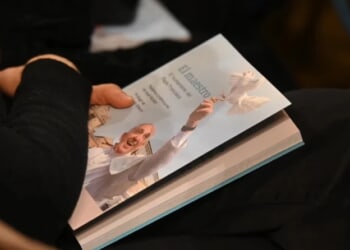The ‘universal present’ is the idea that at some point in the last few decades, history sort-of stopped. Not in the literal sense, of course; time passes, things happen. But whereas for most of the 20th Century there seems in retrospect a clear and fairly rapid progression between different eras, that is no longer the case.
Cultural critics made this observation first, noting how a photograph from ten years ago no longer looks like a snapshot of a different time the way one from the 1970s might appear in the 1980s. But politics has fallen into the same rut.
The Conservative Party’s endless quest for the next Margaret Thatcher is a case in point: however impressive one thinks the Iron Lady, she did not seek the leadership in 1975 promising to be the next Stanley Baldwin. Yet in terms of time elapsed, she would not have been reaching further into the past than do people comparing Kemi Badenoch, or whomever, to Thatcher today.
I was put in mind of all this reading in today’s Times that Sir Keir Starmer has, in the words of one ‘Whitehall source’, put “Blairites in charge of growth”.
Such terminology isn’t so egregious as the Tory version, yet. Tony Blair was prime minister much more recently, and several members of the Cabinet served in government during the New Labour era. Nor does refer entirely to an obsolete factional cleavage, even if some of the biggest challenges to the New Labour consensus, such as the planned employment rights reforms, are the product of Starmer’s own government.
But it still suggests that we have perhaps passed whatever tipping point marks the moment when a party gets trapped in the internal present – or, to put it another way, when it runs out of future.
Is that an absurd thing to say about a governing party with a big majority? Perhaps, if taken very literally; Labour still seems likely to get to at least the end of this parliament, even if its fortunes beyond the next election are now uncertain.
What I mean is perhaps better described as a party exhausting its capacity to adapt to, and orient itself towards, the future – a process well-known on a personal level and generally described as ‘getting old’. And that definition really does seem to suit the Starmer Government rather well.
It was, after all, elected to office with a truly extraordinary dearth of ideas for what to do with it. Senior ministers appeared genuinely to believe that simply ‘getting the grown-ups back in the room’ would be sufficient. (Even now, some sources were reaching for the same forlorn metaphor to describe the Prime Minister’s reshuffle of his economic advisers earlier last week.)
Upon realising that this was not the case, the Government has oscillated between lethargy and panicked, self-defeating action. Rachel Reeves made sensible reforms to the deficit target (i.e. making it an actual target by fixing the date, rather than Jeremy Hunt’s ‘rolling’ target which insulted the intelligence of anyone who learned of it) but did not realise that in so doing she was creating a bond-market bear trap, which she then blundered right into.
The whole saga is worth a longer piece, but the short version is that the Chancellor ended up bringing forward a programme of welfare cuts because she needed to make a sharp correction to Britain’s fiscal trajectory with at best a couple of months’ notice. Labour MPs hadn’t been told about it and wouldn’t wear it, and Starmer was eventual rewarded with what would be a bleak inflection point in the story of his government (his Chancellor weeping in the Commons and unable to deliver Budget measures) had the curve ever had an upward trajectory in the first place.
Now the Prime Minister is stuck in a loop. Last week he brought into Downing Street several new economic advisers, including the man who took point for the Treasury during the bruising negotiations over the spending review. But what’s the point? As we noted at the time, their advice will probably be to pursue courses of action which, however economically sensible, Labour backbenchers will not support, and Starmer has already shown that he either cannot or will not face them down.
It’s the same story pretty much everywhere. The Government knows what outcomes it wants – economic growth, more housing – but few in the Cabinet seem to have a mental model of the economy which might furnish a diagnosis.
As a result, policy and intention pull time and again in different directions: taxes and employment rights legislation hammer employers, ambitious social-engineering objectives freight housing policies, etc. Ed Miliband is given licence to pursue Net Zero policies which, whatever their environmental merits, promise both to worsen and entrench Britain’s energy crisis by heaping further costs (in the form of covering subsidies, constructing new infrastructure, and maintaining redundant capacity for intermittent renewables) onto bills.
Yet such chaos and contradiction, bad as it is, it at least evidence that a particular political molecule is possessed of enough energy to be bouncing off reality, however erratically. On others, there is mere inertia. Any pretence that the Government is going to tackle the looming apocalypse in social care has been punted into Hunt’s future-that-never-arrives; the similar condition of the university sector has been been met with a politically painful, but fiscally irrelevant, rise in tuition fees. Across broad swaths of public policy, the strength of the Government’s intellectual efforts can be measured only in Kelvin.
None of this is especially surprising. Despite the Conservatives’ many faults, the Right has at least an easier time conceptually orientating itself towards today’s problems because – and how to put this – it is the ‘party of’ fewer of them. Labour is the ‘party of’ mass tertiary education, the ‘party of’ ever-more generous entitlement spending, the ‘party of’ liberal immigration rules, the ‘party of’ the Human Rights Act, et al.
To be sure, the succession of Tory governments between 2010 and 2024 seldom stirred itself to confront any of these issues, most of which simply got worse, and it owns its share of Britain’s morbid symptoms, being the ‘party of’ the Green Belt and ordering the entire economy around the enrichment of the over-60s, amongst others.
But beyond the current and particular shortcomings of the Party, one or more potential right-wing policy programmes aimed at Britain’s current problems are conceivable, and evident in the Right’s broader intellectual ecosystem.
That is not, on present evidence, true of the Left. Britain is a high-cost, low-wage, low-growth economy, the government of which is trapped sucking spending power out of the productive economy to prop up vast subsidies for less-productive sections of the population. This not only worsens the long-term economic situation but also, for the Left, the social-political environment. The only way out is sustained growth, but the policies which tend to deliver strong economic growth are a) generally well-known and b) unpalatable to the Left, which is much more comfortable spending the proceeds.
(Much of the commentary comparing Starmer unfavourably to Blair seems to miss this. To be sure, the latter was a generational political talent and in some spheres a bold reformer. But his biggest contribution to any serious overhaul of Britain’s fundamental economic model was accepting it (and then getting down to spending the dividends). Starmer has many faults, but the failure of the previous Conservative government to likewise do the hard graft on economic transformation isn’t really one of them.)
A few ministers may, where their own talent and instincts coincide with sufficient latitude from the centre, make incremental steps towards solutions in some areas, as were Yvette Cooper and Shabana Mahmood before their reshuffling – and even then, the Government risks getting very little credit if it appears to have had to be dragged bodily towards half-hearted solutions by the threat of Nigel Farage.
But the rest of government will live in a sort of fantasia where, no matter how existentially bad the big picture, the day-to-day of politics remains locked in some happier year, when all that was asked of it was better communication, some fresh perspectives, the odd fiddling regulation, and perhaps a task force or two.





![Gavin Newsom Threatens to 'Punch These Sons of B*thces in the Mouth' [WATCH]](https://www.right2024.com/wp-content/uploads/2025/08/Gavin-Newsom-Threatens-to-Punch-These-Sons-of-Bthces-in-350x250.jpg)
![ICE Arrests Illegal Alien Influencer During Her Livestream in Los Angeles: ‘You Bet We Did’ [WATCH]](https://www.right2024.com/wp-content/uploads/2025/08/ICE-Arrests-Illegal-Alien-Influencer-During-Her-Livestream-in-Los-350x250.jpg)

![Black BET Billionaire Donor Stuns Democrats, Gives $500K to Winsome Earle-Sears [WATCH]](https://www.right2024.com/wp-content/uploads/2025/08/Black-BET-Billionaire-Donor-Stuns-Democrats-Gives-500K-to-Winsome-350x250.jpg)




